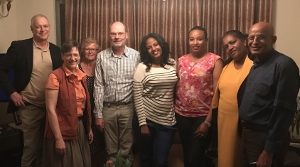After dinner, it was time for a nap. In reality, this 2 hour jet-lag is not bad compared to the 11-hour jet-lag when coming from the USA. It was a bit hard to wake up, but I’m glad I did. We were off to dinner at the home of an Ethiopian pastor, K…, with his wife and 3 of his 4 young adult daughters. We were joined by two Danish missionaries who are back for a shorter visit this time, and we are off to visit their former pastor.

On the way, there was an overwhelming amount of construction. It is amazing growth here in the city.
At K…’s home, I had my first injira in Ethiopia. (I’ve had this staple of Ethiopian food in 3 other continents, but my first time in its home country. A shipment is actually flown in weekly into Sweden!) This is the traditional and ubiquitous food. Typically, various vegetarian and meat stews are poured over a base layer of injira in the center of a plate, if individual servings, or on a platter for a table with a small group. This was buffet style with rolled portions of injira ready for the taking. These are torn into pieces to pick up the stews (with one’s right hand).
They had women guests go to the buffet first, and fortunately the Danish missionary walked me through the protocol. She has been in Ethiopia for many years but not consistently since 1983. Her husband actually waited for her to come back from Ethiopia from her first term, because she was committed to serving the people of Ethiopia. (I had to pause for a bit, because I am watching the weaver birds outside my guest house window.)
The dinner was very nice, filled with conversation and stories. They all speak Amharic, but they also all speak English, a second or third language for all. But they are speaking English so that I am included. They did have silverware on the table, but I joined in with the others and ate by hand. (Eating with one’s hands sometimes happens in Tanzania, though as guests, we often are provided with spoons.)
(The weaver birds are quite a distraction. I got my binoculars out.)
After dinner, we were served coffee or tea with some popcorn (cooked with a hint of sugar). Then I listened to more stories.
The interesting story is about K’s first church. He was asked to go to an area where there was no church and start a church. He went every day to this neighboring town, but there were no Christians. So, he went every day to a tree, sat under it and prayed. He talked with people around town, and six months later, a young man committed to follow Jesus. Then later, another. He said his first worship service had 3 people, and the first offering was 1.5 birr, perhaps 5 cents, if that. The start was difficult, but slowly a church started. Things were even more difficult during the Marxist regime. They were forbidden to hold a worship service. At one point, K prayed with his congregation about whether they should have a service. They agreed to join him in this unlawful act. For K as the pastor, the stakes were the highest; it meant that he could be thrown in jail. They met, and they were never stopped. The services continued.
I’m not sure, but from my limited knowledge of history, it seems that Marxism was shortest lived in Ethiopia, from 1974 until 1991. I was told of two significant influences. First, the great famines of 1973 and 1984 demonstrated that the government system was unable to serve the people. The people were angry at the government. Secondly, with the fall of Communism in East Germany and the Soviet Union, the support that propped up the government here vanished.
The other unique aspect of Ethiopia is that it never was colonized. Somehow they define one period in their history as an 8-year “occupation” by Italy, but I understand that it was not the whole region and it is distinctly different from a colonization. Here’s the Wikipedia summary:
“Menelik had signed the Treaty of Wichale with Italy in May 1889 in which Italy would recognize Ethiopia’s sovereignty so long as Italy could control an area north of Ethiopia (part of modern Eritrea). In return, Italy was to provide Menelik with weapons and support him as emperor. The Italians used the time between the signing of the treaty and its ratification by the Italian government to expand their territorial claims. This conflict erupted in the Battle of Adwa on 1 March 1896 in which Italy’s colonial forces were defeated by the Ethiopians.”
As a result, they are proud to say that they are the only country in Africa that wasn’t colonized.
This is important to know for me in biblical studies. Why!?! Because, in the rest of Africa, “post-colonial” biblical interpretation is an important approach to biblical studies. So, it is important to recognize that Ethiopia has a different context, one that is very important to their self-understanding.
The dinner at K’s home was amazing, because here were Danes, a Swede, and a newbie American in the home of an Ethiopian family and we shared a kindred spirit that is beyond words. Welcome to Ethiopia!